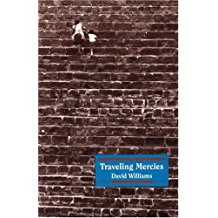What’s the use of art or poetry when fools gamble with the future and destruction looms? Whether it’s fire or flood or Eliot’s whimper, words will not help us. Not then, but now perhaps there is still a chance to rouse those who are sedated and sleeping, to tear them from their flickering lights and make them look around and raise their voices.
These powerful poems do just that. Whether he’s writing about Tiwa children in New Mexico, murdered churchwomen in San Salvador, or his own family’s history in Lebanon, Williams gives us stories where compassion rides on controlled passion. Or, as he says in “Breath”: “The stunned drone of grief becomes the fierce,/tender undertone that bears up the world.”
It’s the tenderness that wins me over. Much of the power in these poems comes from the precise details and voices he summons to describe people, before releasing them into something larger. He describes a girl he taught who, before beginning to draw, closed her eyes and crossed her arms “and maybe went flying//to the mountain lake source of her river”.
Of his grandmother he says:
Half-blind seamstress, never learned
to read, except the Novena booklet,
holiday cards, supermarket ads,she reads futures in coffee grounds,
and we gather round with our cups.She’s afraid to look these days.
Too many deaths. Wait and see.
You’ll know when the time comes . . .
These poems are as relevant today as they were when this book was published almost twenty years ago. Williams shows us how the past lives on in us, writing about his grandfather on the mountain with his sheep listening to wolves. In another poem, he describes finding “. . . an apple tree/still bearing the fruit of the Levant” and says:
The body keeps faith with something
even stripping its own nerves.
A gesture, a glance, is passed on.
Blue shadows of Lebanese cedarsstill move over us here . . .
He writes about old wrongs, tragedies that live on in us. I used to think that ridiculous until I found myself arguing about Glen Coe, surprised by my own passion over something that happened hundreds of years before I was born. True, it was my family, my ancestors, who were massacred. But then I remind myself that with the world grown so small, we must all be family now.
What would you say if right now you could, like Emily Dickinson, write a “Letter to the World”?

Thank you for introducing me to this book. It sounds like a must read. I’ve just ordered it and look forward to absorbing his words.